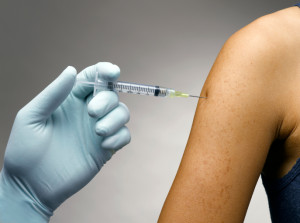May 8th, 2013
Restart, and a Focus on Vaccinations
Jonathan Schwartz
After a false start, we’re back at it here on the Residency Training blog! From now on, I plan to post most Wednesdays, with some randomly dispersed surprise posts thrown in for good measure. As always, if there’s a specific topic you’d like to see addressed, feel free to make note of it below in the comments section.
That said, let’s get into this week’s topic. I do my best to stay on top of the current medical literature, which I often summarize and pass along to the housestaff and students during the preamble to my daily morning report sessions. While browsing recently, I noticed a theme that appeared in a number of publications: vaccinations.
Unfortunately, vaccinations have been a controversial topic, primarily driven (at least in my opinion) by the lay public and the media. The allopathic and osteopathic medical communities are slowly gaining some ammunition in the argument with the naysayers, and, fortunately, this has come in the form of high-quality data stemming from well-designed trials. I couldn’t be more delighted, as I truly believe vaccinations have been the single greatest medical intervention with the widest impact on humankind.
To touch on a just few of the recent papers centered on vaccinations that caught my eye recently:
- Genital warts in young Australians, 5 years into national human papillomavirus vaccination programme: National surveillance data — The HPV vaccine has caused somewhat of a controversy here in the U.S., as some parents have been reluctant to administer this vaccine to young children. However, this study provides some longitudinal data showing significant benefit just 5 years after a national vaccination program was enacted. It will be interesting to see just what impact the HPV vaccine has on malignancies with significantly longer follow-up. First Watch summarized the data and findings.
- Varicella Death of an Unvaccinated, Previously Healthy Adolescent – Ohio, 2009 — This article serves as an important reminder about “catch-up” vaccinations in our patients. This case was of particular interest to me, as we encounter many unvaccinated patients in our training hospitals. We can easily forget to address this topic in primary care, or simply relegate it to such low priority that we never discuss it — with so many other complaints to address during already-too-short office visits. First Watch also provided a nice summary of this article.
- Effect of an investigational vaccine for preventing Staphylococcus aureus infections after cardiothoracic surgery: A randomized trial — I found this interesting, because as it highlights the often-overlooked risks of vaccinations. This trial (somewhat surprisingly) showed excess postoperative multiorgan failure and death from staphylococcal infections after an investigational vaccine was administered prior to cardiothoracic surgical procedures. It does not establish a causal relation (and, it is interesting to ponder how this would occur, from a pathophysiologic perspective…). That said, in the past, other vaccines have been shown to cause more-severe disease. Journal Watch Infectious Diseases published a nice summary of this article
- Lack of association of Guillain-Barré Syndrome with Vaccinations — After reading the previous article, you may become more diligent about discussing potential side effects of vaccinations with your patients. In this study, researchers examined the longstanding link of Guillain-Barre Syndrome (GBS) with vaccinations (traditionally associated with the annual influenza vaccination). While this is a retrospective study (and hence the evidence is not quite as strong as a randomized, controlled trial), the sheer number of patients included is staggering. The investigators found no causal relation between GBS and any vaccines, and the benefits of vaccination far outweighed the risk of developing GBS.
- The success of the longstanding fight to eradicate polio is nothing short of incredible. Just 223 cases were reported in 2012, with a drastic and steady decline over the past few decades, largely due to an incredible effort to vaccinate at-risk populations in endemic areas. The Scientific Declaration on Polio Eradication outlines specific methods about how this will be achieved. It is a lofty goal, but one that I believe is definitely obtainable. First Watch discusses this statement.
What has been your experience with vaccinations and patients who resist getting them? How have you handled these patient interactions? After looking over these articles, let me know, and we can discuss it!

